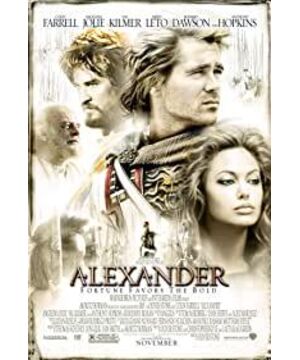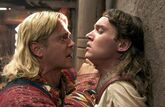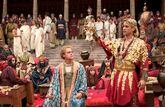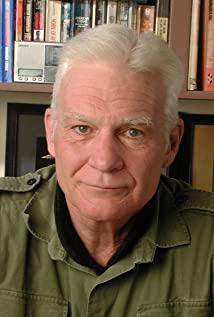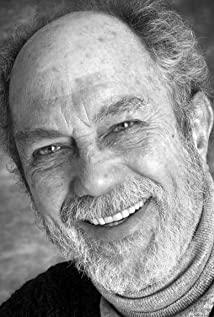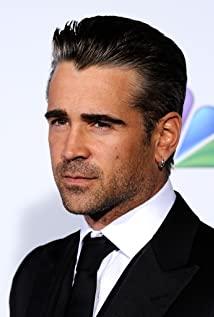After thinking for a long time, the author decided not to write with the mentality of "Huh? Is this historical truth?" - based on believing in Stone's dedication and enthusiasm, I also avoided writing it for research. At the very beginning of the movie, Fu put the camera on Babylon Palace: the servant who carried the medicine pushed the door open, and the camera moved according to the sight of the servant, passing through the crowd of generals in the room, Roxane's cry, and the different expressions of the generals. , then Alexander, "We beg you, tell us who", however, (also known from the end) he sees only: the statue of Hephaistion, Roxane, The Two Wars, Hindu Kush, Father, Brusevros, The eagle, the mother, the ring from Hephaistion, the huge swinging fan embroidered with eagles, and then he lowered his hand and the ring shattered.
The author will restore Stone's character construction of Alexander from the analysis of the expression and display of the elements and symbols of the things that Alexander saw before his death.
(1) Hindu Kush - The known world, dream world and honor
is quite impressed with the map in the film - from beginning to end. These maps are like this: Greece is in the center of the world; the ruler of the east is Persia, which controlled 4/5 of the known world before being conquered by Alexander, and further south, that is India - the end of the world, the sun rises Kingdom, a place mythologically richer than Persia, and has never been explored or conquered. From an early age, Alexander asked: "We are higher than the Persians, why can't we rule them?", "Why are the places you mention in the myths known?", "It is these myths that lead us to our greatest glory. , then what was wrong with them?"
So, from Gaugamela in 331 BC, to Northeastern Persia, to Scythia, to Sogdiana Sogdia), to Bactria, to Hindu Kush, to India... He is afraid, he is restless, he wants to change, he sees the future (a thousand times different), He spied the truth (unlike what Aristotle said), and he wanted people as Alexander's army, to go where they never thought they could, to be soldiers, to work in the city, to bring Egypt to the lands of Alexandria and The people were united, and he wanted the light of Alexandria to shine on the world known and unknown—though it seemed enslavement to the dreamed. He was angry at the generals' malice towards a world far older than theirs. He wants to free the uncivilized slaves and free the people of the world, and that glory will surpass Achilles and Herakles and rival Prometheus. This is his dream world.
Like Achilles, the price of great glory is an untimely death. In glory and in life, it was a no-thought choice for him. Even if this glory is so illusory, it cannot escape the cold-blooded revenge of the gods. "We are the loneliest when we are with the myth," he said, however, without hesitation.
Hindu Kush blocks his way to the East China Sea, which in his dreams is the hopeful passage to the end of the world. However, "every time I step on a piece of land and cross a dividing line, I lose another fantasy. I feel that death is the final destination, so I work harder to find my destination, even if it is suffering." "If I reach the other side of the world, I will turn around and conquer the other half.".
As if to confirm Aristotle's admonition: "The East will devour people and their dreams, be wary of what you dream, and the gods will punish such arrogance." True. The war in India was tragic, the Macedonian camp fell apart, the Hephaistion died...
Yet, Alexander said: "When it's over, it's what you do."
"Before him, it was just the tribe; after him, everything was It's possible." His name is fleeting like a shooting star on the scroll of history, but it leaves behind a dazzling ray of light that spans a long time and carries its influence to the present and the distant future.
(2) The gods are above:
There are many gods mentioned in the lines: Apollo, Ares, Zeus, Athena, Her, Prometheus, Jason, Aphrodite, Dionysus, Herakles: etc. The author focuses on the dialysis of Achilles and Oedipus.
It can be said that under Stone's writing, Alexander and Achilles shared the fate, in addition to the gene in the blood of this colossus, there are also influences from parents. The author still remembers the dialogue between Alexander and his father Philip in the Pella cave. Little Alexander is full of admiration for the hero. He said that Achilles was his most revered god, because he was born fearless and never feared the choice between life and glory. He is still the little Achilles in his mother's heart, and his mother told him since childhood that he is the son of Zeus, and he has the noble blood of Achilles flowing through him. “You are too honorable for that. No doubt influenced from sleeping with Tales of Troy under your pillow.” Kassande said. He longed for glory comparable to Achilles, and he fulfilled his longing, he reached the known and the unknown, and he never failed. He made the same choice as Achilles, unafraid to die young. In addition to great glory and short existence, Alexander and Achilles shared a journey of love.
"Oedipus, the poorest of men, it would be best if you were not born, because your destiny was to kill your father and marry your mother." Freud quotes this Alexander is the off-screen protagonist of a myth that develops the overall "Oedipus plot" of the psychological organization of parental love and hate desires. The mother claims to be a descendant of Achilles; Alexander is the son of Zeus; teaches Alexander that "people and snakes are of one mind"; and strives to "be the one who cares most about his son." Before Alexander's expedition, Olympia's "your soul is mine, Alexander"... This kind of psychological control started from Alexander's childhood, continued to his youth, and even accompanied him throughout his expedition. Even though he was thousands of miles away in Macedonia, he could not escape the letters that haunt him, and his wife, Roxane, who has a shadow of his mother. The same black hair, dark skin, deep eyes, 'barbarian' fat lips. Before the night of the bridal chamber, Alexander removed the snake ring on Roxane's arm - a habit of her mother to put Alexander to bed as a child. Alexander, who escaped from his mother through the Eastern Expedition, subconsciously married a queen who resembled his mother, and removed the snake ring with his own hands, which not only satisfied his fantasy of his mother, but also achieved a psychological victory over his mother. . On the balcony of the Babylonian night, Hephaistion once asked: "I wonder if you are running away from your mother after so many years and walking so far?" Alexander answered vaguely in the past, because he was clear in his heart but was afraid to admit it. For his father Phillip, he resisted, gradually became more and more subconscious, and eventually imitated his words and actions unconsciously. Young Alexander boycotted his father because of his mother. An adult Alexander stood on the balcony of the Babylonian Palace, and in the face of Hephaistion's question, he blurted out: "who know these things"; Alexander called Roxana's handmaid "goblin"; from when he was young, he didn't like to drink to adulthood, but he won a lot of cheers ; and after Hephaistion died, he pinched Roxana like Phillip had pinched him, and the picture Alexander saw on the bronze mirror on the side was a confusion of memory and reality. The interweaving of memory and reality, from resistance to unconscious imitation, is Alexander's most authentic and direct portrayal of his father's emotions.
(3) Bucephalus and the Eagle:
Bucephalus: the mighty and firm
Bucephalus and Alexander
The means by which Alexander tamed Bucephalus is an illustration of the complex of Stone writer Plutarch's Biography of Alexander the Great. Alexander saw Bucephalus' fear and anxiety about his own shadow, just like himself. He told him that it was the fault of the sun god Apollo, and we need not be afraid. With his agility, the young Alexander turned his horse's head and rode on the reckless black horse and galloped towards the sun. He not only conquered a fierce horse, but also conquered the conceited Phillip II and the queen who was worried about his son. In the years that followed, Bucephalus remained his most faithful companion, strong and steadfast, and he followed Alexandre to the north and south until the last war. In the battle of India, Stone captured the slow-motion scene of the horse and the elephant slowly standing up against each other.
An eagle accompanied him all the way. On the Gaugamela plateau, in the sky, an eagle soars above the Macedonian army, overlooking the war. "Zeus is with us", Alexander raised his head and cheered, all of which made Alexander almost incarnate as an eagle-like hero, and this war also showed the take-off of the Eagle Empire. On the corpse field after the battle, the eagle's eyes that overlapped with Alexander's eyes were sharp and proud. In the Hindu Kush Mountains, Macedonia lost in the passage at the end of the world, he asked: Where has our eagle gone? . Before his death, Alexander saw an eagle from a hallucination, on the huge swing fan, it seemed, this was a symbol of Alexander's return in the form of an eagle. Outside Olympia's palace, an eagle flew down from the sky, biting a cunning snake to death, the eagle fell, and Olympia saw this and howled loudly: "No!" - The Eagle Empire has fallen . The eagle is the symbol of Zeus, and the mother Olympia keeps telling Alexander that he is the son of Zeus. Accompany him in the sound of his journey, honor him, and fall with him.
(4) Two-color wars:
Two wars are featured in the film, two colors - in Stone's color application skills. The first is the Battle of Gaugamela, where Alexander and the Persian army have fought many times in history, and the film condenses them into a fierce battle shortly after the opening. The textual research of the Macedonian phalanx in the film is in place, which is basically consistent with the historical books. The Macedonian army cooperated with the infantry phalanx and the motorized cavalry. Alexander took Darius III from the flank, and Parmanuel and his son defended the enemy's army. For one to two hours on the left flank, Antipater was in charge of the central formation, blocking it with a human wall in the middle (using infantry to block the cavalry), leading the enemy's cavalry from the right flank, and then Kazan had to find a breakthrough on the left flank, and others followed him and took the opportunity to break through. Go straight to Huanglong and win in one fell swoop. The fast-moving long shots show the fierce battle scene where the two armies face each other, and use the eagle's perspective to view the grandeur and tragic situation of the overall battlefield, with a strong sense of on-site realism. Under the tobacco filter, the ancient battlefield filled with yellow sand, his golden curly hair, the wooden spears, armors and shields of the Macedonian army, his face in the sunlight... The whole picture shows an orange color, showing the roughness of the ancient battlefield. Sensation - detached from reality.
The latter expedition to India has a strong surreal meaning. In the eyes of the Greeks who have penetrated into the secret realm, monkeys and elephants are like monsters, and the continuous rainy season is like a natural disaster. Stone described the tragic war and the subjective feelings of individuals through a red filter. When Alexander was wounded and fell to the ground, the picture suddenly changed to a hellish red and intense, the army was severely damaged, Bucephalus fell, and everything became blurred and depressed. The soldiers fell one after another, mourning everywhere, and blood flowed into rivers. The brutality and bloodshed of war is further revealed in this unique way. Red renders the richness of the battlefield in Alexander's vision, the anxiety of the Macedonian soldiers, and the tragic victory under the blood.
Stone expresses objective changes in color - the former victory indicates the take-off of the eagle, and the latter tragic heralds the fall of the eagle - the end of the journey. It is also used as the external radiation of the characters' emotions and the emotions of the story, so that the audience's mind fits with it.
(5) There is a kind of love
There is a kind of love called Achilles (Alexander) and Patroclus (Hephaistion).
The author thinks that the relationship between them should not be regarded as homosexuality in the modern sense, they are paiderastia, pure and noble. "Love between men is about bringing out the best in each other, and it's the kind of love between men that builds the city-state and frees us from the situation where we're just sitting there watching the sky," Aristotle said.
Alexander said that Achilles was his favorite god because he loved Patroclus and avenged his death. Because he was born fearless, when Patroclus was beheaded by Hector, Achilles was in extreme pain and burst into tears. So Alexander promised Hephaistion, "Even if there is no king in Macedonia, I will avenge you." So, on the eve of the battle of Gaugamela, he hoped that they would never question each other like Achilles and Patroclus, they promised each other that if the other died first , to avenge it, and then go with it.
It was Hephaistion who stood up when his father humiliated and rejected his mother; when Alexander was overwhelmed by his father's death, he held up his hands and declared our king; when Alexander killed Cleitus and was terrified and terrified, it was He stood by his side; when the generals and soldiers kept questioning betrayal, he was the only one who would always support him... He told the Hephaistion bedside how much they had traveled and experienced together over the years, and said that they were going to go to more places together. Far away, accomplishing greater conquests, saying make him get better soon, their ships have to set off, he can't live without him...
He said he was Alexander too.
"The fear of death drives all" But there is also a love.
He said, I only know that in this world I only trust you, I miss you, I need you, the one I love is you, Hephaistion
is no one else. You will never lose me, I will be with you always. Till the end.
For example, the ruby ring, which symbolizes the deep affection between Alexander and Hephaistion, comes from the time when the ancient Egyptians worshipped the sun and the stars, and Hephaistion wore it for Alexander Shi said affectionately: "I see you as the sun, and I pray that your dreams can shine on everyone." Hephaistion is the only one who carries all his dreams, strong and weak - Jared Leto's beauty and charm make Hephaistion even more deeply rooted in the hearts of the people.
Therefore, when he died, Alexander said: "When your body and mind can't take it anymore, you're about to collapse, you don't know what to do next, and then when you look back, you find that happiness is there." So he kept his promise, Follow him - because there is no one to protect his fragility.
Epilogue
The film depicts Alexander's humanity and divinity through the depiction of various elements. Despite being overly vulnerable due to human frailties and rich and delicate emotions, Stone's Alexander remains a mythical hero throughout the ages. Although there is a bit of a Western-centric prejudice, we believe that even though he is an ordinary person, Alexander is a glorious colossus. Vangelis' electronically synthesized acoustic music adds to the epic momentum.
View more about Alexander reviews


